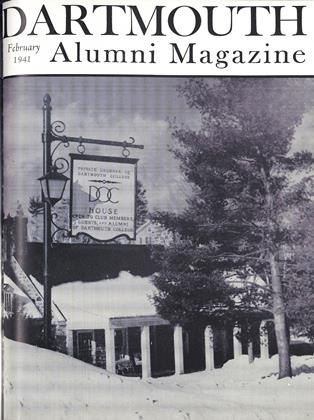THE TEMPORARY LOSS of his voice, embarrassing to him in his pastorate at Amherst, N. H., may have been one of the factors which led his fellow Trustees to elect Nathan Lord to the presidency in 1828 and for him to accept. Whatever may have been the cause, he was to serve the institution for the following 35 years and to be recognized (despite certain eccentricities) as one of the leading college executives of his day.
President Lord was characterized by a mind of singular acuteness, coupled with a crystalline clarity of expression. He was firm in his opinions and prone to controversy, but so conciliatory in manner as to lead even his opponents to say, "It is more delightful to disagree with President Lord than to agree with other men." He was an excellent judge of men. He never cherished rancour when his opinions did not prevail. His keen sense of humor was at times a trial to him, in the attempt to preserve the austere dignity that his position was supposed to demand. He was successful in the discipline of the rough student body of his day. By them he was regarded with the awe with which an ancient Hebrew prophet might be looked upon, but, at heart, he was the kindest and most sympathetic of men.
He found the College poor and he left it poor, but not so destitute as it had been before. For many years, during his time and after, Dartmouth was far less prosperous than its rival institutions. This result, however, was not due to lack of effort by President Lord, nor were those efforts entirely devoid of result. Four new build- ings—Wentworth, Thornton and Reed Halls and the Observatory—were built, the Chandler Scientific School was established, the first Alumni Association was organized, and the beginnings of a suitable endowment fund were secured. And the faculty, despite the meager pay of its members, constituted a strong teaching group.
President Lord had many eccentricities of belief. In theology his conservatism went beyond the bounds generally considered adequate by the most conservative. Through his influence the "non-ambition system" was maintained in the College, ambitions for scholarship honors and prizes being considered by him as sinful. Most striking was his support of slavery, on the basis of the Holy Writ, as a "divine institution," an attitude which, during the Civil War, caused the Trustees to take such action that his resignation was practically enforced. These divagations now appear to us to be of slight import in view of the industry, devotion, and real strength of the man.
V. NATHAN LORD 1792-1870 Bowdoin, Class of 1809; President, 1828-1863
 View Full Issue
View Full Issue
More From This Issue
-
 Article
ArticleClassicist Not Without Honor
February 1941 By Donald Bartlett '24 -
 Article
ArticleA Kind and Comfortable House
February 1941 By S. C. H. -
 Article
ArticleThe Undergraduate Chair
February 1941 By Charles Bolte '41 -
 Class Notes
Class Notes1924*
February 1941 By ALFRED A. ADAMS JR. -
 Class Notes
Class Notes1939*
February 1941 By ROBERT W. GIBSON -
 Class Notes
Class Notes1921*
February 1941 By CHARLES A. STICKNEY JR.










